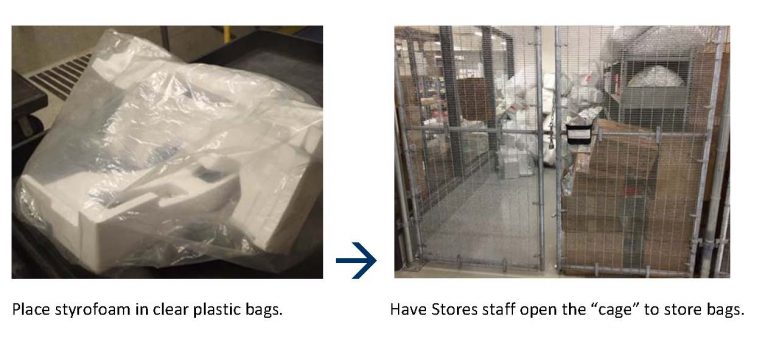How to recycle or reuse various materials at the Life Sciences Centre.
View:
Aerosol Cans
If the aerosol can is completely empty, and does not contain any toxic residue, it can be placed in a grey “Recyclable Containers” bin.
Aluminum/Tin Foil
Dirty aluminum foil (with food or chemical residues) should be placed in the garbage. Only clean tin / aluminum foil (such as that used to wrap items for sterilization) can be placed in the grey “Recyclable Containers” bin.
Amber Glass
- The amber glass recycling bin is located outside the Styrofoam Cage, in the loading bay area.
The Life Sciences Centre is taking part in the UBC Green Labs Amber Glass Recycling Program. In this program, participating labs and buildings are tasked with collecting amber glass containers 50ml-4L, completely removing all caps and labels, and placing the bottles in a central amber glass recycling bin. We ask that all lab managers read through the program guidelines and share them in your lab to ensure that amber glass at LSC is properly and sustainably disposed of.
We recommend overnight soaking, followed by scraping to remove the labels. Plastic Scrapers to facilitate label removal have been placed in the autoclave rooms 2.438, 3.348, 4.538 and 5.538.
Appliances and Instruments, Small
Microwaves, toasters, kettles, etc. as well as small, clean lab instruments can be handled through the LSC e-waste stream (see “Electronic Waste” tab below).
If the unit is no longer needed but is clean and in working order, consider listing it on the Reuse-it! UBC.
Note: All lab instruments / equipment are to be thoroughly cleaned and disinfected prior to being recycled or discarded.
Appliances and Instruments, Large
Large appliances (refrigerators, freezers, dishwashers, etc.) and larger laboratory equipment (centrifuges, etc.) are collected by Building Operations for recycling.
To move large items to the LSC loading bay area, please place a service request using PeopleSoft Financial Management System (FMS) or contact the LSC Operations Manager at 604-827 3936.
If the unit is working but no longer needed, consider listing it on the Reuse-it! UBC. However, older (i.e., pre-1993) refrigerators and freezers can often be energy-intensive so it may be better to retire them.
Battery Recycling
Waste alkaline and rechargeable batteries (and cellphones) are to be placed in the green and beige, “Battery and Cellphone” recycling boxes. There is no need to segregate the batteries.
There are three primary battery/cellphone recycling stations at the LSC.
- West side of the LSC Main Concourse: in the nook next to the West Stairwell
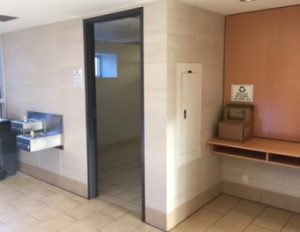
- The LSC Chemical Waste Room (B2.213): downstairs on B2 level (waste management area)
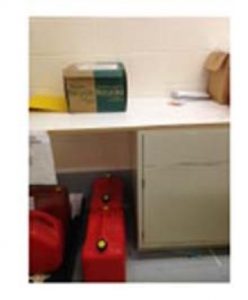
- LSC Shipping and Receiving downstairs on B2 level (secure cage in LSC Loading Bay area) – Note: A key-card is required to access this location.
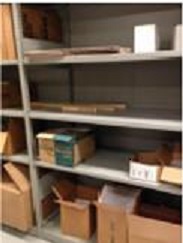
Cartridge Recycling
Ink and toner cartridges are part of BC’s Extended Producer Responsibility (EPR) Programs.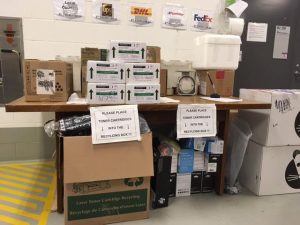
Alternatively, please place your used cartridges in the cartridge recycling boxes located underneath the courier station stable in the LSC Loading Bay area (on B2 level).
Cell Phone Recycling
Used cell phones (and cell phone batteries) can be recycled by placing them into LSC “Battery and Cellphone” recycling boxes. See the “Battery Recycling” tab above.
Compostable/Biodegradable Bags
If they are any kind of plastic-like materials, these cannot be processed by UBC’s composting system and must go in the garbage bin; even if they say they are biodegradable (but of course, please dump their contents into the “Food Scraps” bin!).
Only compost bags that are made of coated paper / fibre are acceptable in UBC “Food Scraps” bins.
Composting – Organic Waste and Food Scraps
Food scraps and food-soiled paper such as napkins and compostable paper food packaging can be composted through the green “Food Scraps” bin at campus-wide recycling stations. These items will then be converted into soil amendment to be used again by UBC gardeners for landscaping right here on campus.
Please keep all types of plastics out of the green “Food Scraps” bins – even plastic labelled “biodegradable” or “compostable”. Plastics are not compatible with UBC’s Composting Facility.
For any questions or further information on what is compostable on campus, visit the UBC Sort it Out.
Containers (glass, plastic, metal)
Across campus glass bottles, jars, pop cans, metal cans, plastic containers and bottles, juice boxes and milk cartons can be recycled in the grey “Recyclable Containers’ bin.
Empty coffee cups are now recyclable, with paper sleeves going into the blue Paper bin.
Corrugated Cardboard
Please place all corrugated cardboard in LSC cardboard collections or in the green “Cardboard Only” bin in the loading bay area on the outside of the LSC.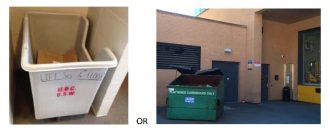
Tip: You can recycle your clean pizza box! Simply place clean parts of the box in the cardboard bin, and soiled greasy parts in the garbage. UBC’s composting facility cannot currently process cardboard.
Disposable Gloves
Collect gloves in your lab. When full, bring them down bagged to the waste management room B2205, and throw the bag into the marked bin.
Disposable Masks
Look for the disposable mask receptacles located at the major entrances to the building.
Dry ice
Please take your left over dry ice to the large metal Dry Ice box conveniently located in the styrofoam recycling cage down by the loading dock on B2 (follow the signs).
Electronic Waste (e-Waste)
UBC Waste Management collects and responsibly recycles campus electronic waste (or e-Waste), which includes old, broken or obsolete:
- computer towers and monitors
- keyboards and computer mice
- scanners and printer
- projectors and television sets
- video cassettes / recorders
- electronic scientific equipment
- small appliances
LSC members can drop their e-waste off in the dedicated e-waste bins in the LSC Loading bay: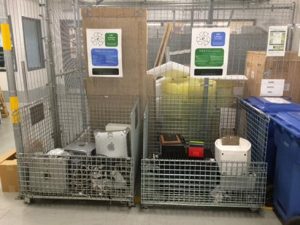
Please place items in bins according to the e-waste classifications outlined above the bins.
Warning: To prevent the loss of personal information, users MUST ensure that all personal / confidential information is completely erased from all electronic devices prior to their being recycled or otherwise disposed. There is NO systematic process for erasing residual electronic data in e-waste!
Foam Bricks
To recycle:
- Always wear gloves (due to possible ph / FA issues relating to contents.
- Cut bag open.
- Remove foam brick and squeeze out water
- Place foam in garbage (can be dried in fumehood before hand to reduce water content)
- Rinse out plastic bag
- Rinse sink
- Dray plastic bag
- Collect bag and bag in “Soft Plastics” recycling bin
Gel Cold Packs
Gel packs have a pH of 6.5, contain 98% water and, depending on manufacturer, either contain 2% carboxymethylcellulose (CMC) or 2% Polyacrylate. CMC is used as an ice-cream thickener and polyacrylate (Wetlock) is used in gardening. Both are non-toxic.
Reusing
- Send back to distributor (if possible)
Recycling
- Cut plastic bag with razor or scissors
- Gel can be disposed in regular garbage, or
- Gel can be put in plants to irrigate, as water get released slowly
- Gel can be composted (but not at UBC due to high water content) so let the gel dry out in a fumehood beforehand – 98% waste reduction!
- Bag is normally #4 plastic and can be recycled (as soft plastic) after being rinsed and dried
Glass Recycling
Glass containers such as pop bottles and jars can be recycled in the grey Recyclable Containers bin at LSC and campus-wide recycling stations.
Laboratory glass: at present, lab glass cannot be recycled but UBC is looking at recycling options. Lab glass to be decontaminated according to approved procedure, accumulated as a sub-solid waste stream in the labs, and then relocated to the LSC Chemical and Glass Waste Room (room B2.213) on B-2 Level. The glass is then collected by UBC Waste Management and sent to the landfill for disposal.
A key-card is required to access this room.
Lab Plastics
Green Labs has launched a marketing campaign for the Lab Plastics Recycling Program to increase participants and support labs in reducing the environmental impact of their research.
The Lab Plastics Program provides guidelines and support for recycling lab materials. Participating labs help educate and create awareness about the program and its guidelines, monitor collection, ensure that only accepted materials are recycled, and coordinate the transfer of full collection bins into their building’s central ‘recyclable containers’ bin.
For more information or to sign-up, please visit https://sustain.ubc.ca/lab-plastics-recycling or contact Green Labs at greenlabs.assistant@ubc.ca.
Light Bulb Recycling
UBC Waste Management recycles light bulbs on campus.
Please contact the LSC Safety and Environmental Advisor at 604-827-4127 if you have light bulbs to recycle.
Paper Products
Paper products can be recycled at campus-wide recycling stations through the Blue “Paper” Bin. UBC Waste Management recycles paper products in large blue tote bins and multi-stream recycling stations.
For more information on what items are recyclable on campus, visit UBC Sort it Out.
Pharmaceutical Waste
Pharmaceutical waste is sent for disposal as hazardous waste through the UBC Environmental Services Facility (ESF).
For more information, please contact the Environmental Services Technician at 604-827 5389.
Pizza Boxes
- Place CLEAN cardboard pizza boxes in cardboard collection bins
- Place greasy / soiled pizza boxes in garbage containers
- Greasy / soiled sections of pizza boxes can also be cut away front he clean cardboard, the portions going to their respective bins
Plastic Bags (Soft plastics)
Plastic bags (a kind of soft plastic) are NOT currently recyclable at standard UBC recycling stations.
In order to recycle soft plastics, they must be collected, segregated and packaged in clear bags:
- non-branded and clear
- branded and coloured
What cannot go in is plastic gloves, contaminated plastic, shaped/molded containers, or LDPE Code #4 containers.
For LSC occupants who generate significant amounts of soft plastics, there is a collection point in the Loading Bay area on B2 level of the LSC (for both types of soft plastics).
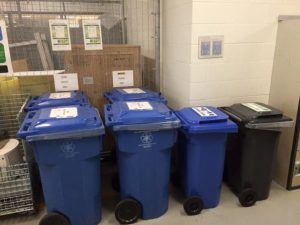
Plastic Containers
Plastic containers of numbers 1-7 (also known as hard plastics) can be recycled in the grey Recyclable Containers bins at recycling stations across campus and in offices. Please place all unmarked plastics in the garbage, these cannot be recycled at UBC at this time.
For more information, visit UBC Sort it Out. The UBC Laboratory Plastic Recycling Program offers a simple solution to recycling in labs. For more information, please contact the Environmental Services Technician at 604-827-5389.
Plastic Ice Blocks
Plastic Ice Blocks generally contain 99% water and 1% Polyacrylate, Acid Blue 9. This is non-toxic.
Reuse
Send back to distributor, give away to food banks, use for camping, etc.
Recycle
Drain blue stuff (non-toxic) and recycle plastic container in recyclable containers bin.
Special Event Waste
Event organizers need to plan for recycling and composting bins appropriate to the event type and the type of waste they generated.
For information on requesting bins, and how to reduce event waste, please refer to the UBC Sort it Out.
Styrofoam
Styrofoam is NOT recyclable at UBC’s recycling stations. Consequently, Styrofoam packaging (such as food trays) should be avoided wherever possible.
As Styrofoam is sometimes unavoidable in lab equipment shipping, simply collect Styrofoam (EPS) boxes and packaging blocks in large clear bags (supplied at LSC Stores Cage) and bring the bags down to the LSC Loading Bay, to the places in the LSC Stores Cage.